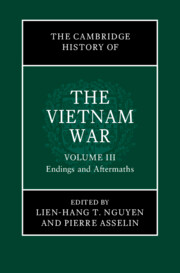Book contents
- The Cambridge History of the Vietnam War
- The Cambridge History of the Vietnam War
- The Cambridge History of the Vietnam War
- Copyright page
- Contents
- Figures
- Maps
- Contributors to Volume III
- General Introduction
- Introduction
- Part I The Late Vietnam War
- 1 Nixon’s War
- 2 US Military Strategy in the Nixon Era
- 3 The US Congress and the Vietnam War
- 4 US Antiwar Sentiment and International Relationships in the Late Vietnam War
- 5 Saigon War Politics, 1968–1975
- 6 Hanoi’s Politburo at War, 1969–1975
- 7 The Vietnam War and the Regional Context
- 8 Moscow, Beijing, and Détente
- 9 The Easter Offensive and the Second Air War
- 10 The Second Civil War, 1973–1975
- 11 Cambodia at War
- 12 Laos at War
- Part II The Postwar Era
- Part III Legacies
- Index
3 - The US Congress and the Vietnam War
from Part I - The Late Vietnam War
Published online by Cambridge University Press: 02 January 2025
- The Cambridge History of the Vietnam War
- The Cambridge History of the Vietnam War
- The Cambridge History of the Vietnam War
- Copyright page
- Contents
- Figures
- Maps
- Contributors to Volume III
- General Introduction
- Introduction
- Part I The Late Vietnam War
- 1 Nixon’s War
- 2 US Military Strategy in the Nixon Era
- 3 The US Congress and the Vietnam War
- 4 US Antiwar Sentiment and International Relationships in the Late Vietnam War
- 5 Saigon War Politics, 1968–1975
- 6 Hanoi’s Politburo at War, 1969–1975
- 7 The Vietnam War and the Regional Context
- 8 Moscow, Beijing, and Détente
- 9 The Easter Offensive and the Second Air War
- 10 The Second Civil War, 1973–1975
- 11 Cambodia at War
- 12 Laos at War
- Part II The Postwar Era
- Part III Legacies
- Index
Summary
Superficially, the Vietnam War might seem a high point of congressional resistance to the Cold War consensus. After all, two consecutive presidents, Lyndon Johnson and Richard Nixon, faced ferocious criticism as they expanded the US military commitment in Southeast Asia. Yet for most of the Johnson and Nixon years, Congress was mostly reacting to executive decisions, and struggled to stop either the escalation of the war under Johnson or its expansion under Nixon. Ironically, perhaps the best chance for Congress to influence Vietnam policy came before a significant commitment of US combat forces, during the Kennedy administration. Yet for a combination of ideological and tactical reasons, members of both the House and the Senate who might have been inclined to challenge the administration’s approach to Vietnam declined to do so in a meaningful way.
Keywords
- Type
- Chapter
- Information
- The Cambridge History of the Vietnam War , pp. 72 - 95Publisher: Cambridge University PressPrint publication year: 2024

